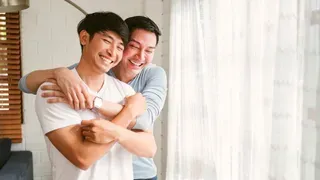August 22, 2015
Preventing LGBT Youth Homelessness: Ruth Ellis Center Pilot Program Keeps LGBT Foster Kids Safe at Home
Winnie McCroy READ TIME: 9 MIN.
Since 1999, Ruth Ellis Center in Detroit has served the needs of runaway, homeless and at-risk LGBT youth. In fact, it's the only organization in the country that has a residential program for LGBT youth in the foster care and juvenile justice system. But studies suggest that these kids are better off when they can stay at home. So now, Ruth Ellis Center has launched a pilot program with Child Protective Services to give foster families the resources they need to be supportive of their at-risk gay youth.
"Child Protective Services has no mechanism to recognize how sexual orientation or gender identity is related to abuse or neglect. So we decided to do a pilot program for kids who identified as LGBT," said Mark Erwin, director of programs at Ruth Ellis Center. "If a family is being investigated by CPS, the investigation will stop if they work with Ruth Ellis Center for 12 months. The incentive is that no family wants to be investigated or lose custody."
The program is based on a similar one founded by Caitlin Ryan at San Francisco's Family Acceptance Project to get Mormon families to support their LGBT youth. Counselors talk to parents and guardians about the dangers of isolating LGBT youth or relying solely on faith to reach a desired outcome. It is heavily based on harm reduction and providing families with the resources they need to prevent youth homelessness to begin with.
Jerry Peterson, executive director of the foster care program at Ruth Ellis, said the Family Group Decision Making program is considered a best practice but has never before been used specifically to identify risks for LGBT youth and their families.
"The goal is to help families stay together when they are under the extreme stresses that have caused them to be reported to the CPS for abuse or neglect," said Peterson. "And the reason we are doing it is because when we meet homeless, runaway and unstable young people on the street or in the child welfare system, most say they would go home if they could be safe."
By their own admission, these kids don't want to be in the street or in foster care or juvenile justice -- they want to be home. Unfortunately, many families react badly when they hear about their child's identity. It creates an unsafe situation in the home, and so youth run away or get kicked out. In the past, these youth often didn't wait for their families to reject them: they left to create a family of choice.
But in today's culture, kids are coming out at an average 13.5 years old -- too young to viably take care of themselves. So Ruth Ellis Center is working to engage these families before their child runs away or gets kicked out, or ends up in child welfare.
"We demonize families for rejecting their young people, but the truth is, these young people will often return there, so we have to make that environment safer," said Erwin. "So this pilot program was started, funded by the State of Michigan and the Andrus Family Fund. If it proves successful, it could be implemented in other countries throughout the U.S."
How Ruth Ellis Works
Ruth Ellis has several components. First, it provides a drop-in center for runaway homeless and at-risk LGBTQ youth ages 13 to 24, where they can access food, clothing, showers, laundry, support, recreation and resources like safer sex and hygiene kits.
"Most of the youth we currently serve are between 18 and 24 years old, and are at the point where they've already experienced a lot of rejection from families, schools, medical providers, social workers, faith communities -- all the institutions that are supposed to be there as a safety net," said Jessie Fullenkamp, youth services director. "Historically, Ruth Ellis Center started responding to the crisis needs of these youth, issues like homelessness, suicide, depression, addiction, survival sex work and HIV/STIs. None of these issues are surprising, but they are symptoms of the root cause of the problem: family and societal rejection."
The second component Ruth Ellis offers is mental health programs. "The mental health program is incredibly important because we know that LGBT youth, especially those rejected by their families, have a greater risk of depression, high-risk sexual behaviors and drug abuse," said Erwin.
Fullenkamp noted that individual and family counseling can help families create group decision-making models, so that a parent who is struggling with a child's sexual orientation or gender identity can understand their child and begin to talk about it. The program helps youth say what they need to feel accepted, and allows parents to approach them with more understanding. As he notes, acceptance of LGBT people is on a spectrum, with violence on one end and acceptance on the other. They aim to get families into the "moveable middle."
The third component of Ruth Ellis Center's program is the services it provides for LGBT youth ages 12 to 17 who are in the Michigan residential foster care program. It is only one of only two agencies in the entire country licensed and contracted specifically to help LGBTQ youth. A recent report from the Williams Institute suggests that 1 in 5 youths in foster care identify as LGBT, and they're just as disproportionately affected by foster care as by homelessness.
"We realized early on the potential of this program and are so excited to be working with youth before they get to the point of homelessness or rejection to prevent them from a permanent separation from their family," said Fullenkamp.
The Future of Ruth Ellis Center
Ruth Ellis Center is currently raising funds for a wellness center for LGBT youth and hopes to finish in spring 2016. It has demolished 5,000 square feet of the first floor to develop a clinical space for behavioral health, substance abuse, primary health care, individual family and group counseling, and HIV testing and counseling. It will be a one-stop shop to meet the needs of youth who are not comfortable seeking services at mainstream clinics.
"Young people don't use the free clinic four blocks away. They say there is still stigma and discrimination; they are sick of being misgendered or are not comfortable disclosing their identity," said Erwin. "After 15 years, Ruth Ellis Center has established ourselves. They know who we are and are more much likely to access health services if offered by Ruth Ellis."
Workers like Fullenkamp see the daily struggles of being adolescent and filtering everything they say so that they can stay in the closet and stay safe. He said that at least while they are at Ruth Ellis Center, these kids can be who they truly are.
"You can literally see the stress drain from their body," said Fullenkamp. "The first time they take the tour and see they are in a space that is LGBTQ specific, they just light up. They see people who are like them, who are healthy and happy and safe. To create an environment that immediately reduces stress and isolation and increases the protective factors is very powerful."
Fullenkamp focuses a lot on "trauma-informed care," listening to vulnerable communities about the things they identify as traumatic: violence, rape, murder, being HIV-positive or experiencing stigma. They ask the young people what they need, rather than make assumptions about how to address these issues.
This strategy follows into the center's optional employment counseling. After years of disappointment over LGBT youth not being able to hold on to jobs, they retooled the program from a trauma-informed model. Rather than assume that youth have to ability to plan ahead or solve problems, counselors now show their clients how to use a planner, and do it over and over again until it becomes a daily habit.
"It sounds like a lot of hand-holding, but if you understand how trauma affects the brain, it's a necessary component," said Fullenkamp. "Some people just attribute it to being lazy or stupid, but really it's related to trauma. These are vulnerable populations, and you have to adjust to them, support them and provide safety."
Although she first began coming to the drop-in center in 2012, 22-year-old outreach staff member Emani Love never took advantage of the program while she was a teenager. A summer internship led to a part-time staff position.
"I wanted to be exposed to a new environment, and feel less isolated by engaging with people who share my identity," she said. "I think that the age similarities I share with the people I serve creates a level of relatability that allows for connection building."
Love helps do outreach at the drop-in center and is also part of the Street Outreach Team, hitting local hangout spots, bars and parks and connecting with LGBT youth, transwomen involved in survival sex and others to share information about Ruth Ellis Center's culturally competent resources and transitional housing programs.
She has learned to be socially aware, emotionally intelligent, and available to her community and people, as well as the importance of staying grounded and keeping your mind clear. The work appeals to her background and upbringing of service and healing.
Youth Staff Outreach Coordinator Q Watkins was hired at the same time as Love. At the time, her girlfriend had been kicked out of her home for being gay and was staying with Watkins. Watkins' mother, who was supportive of the girls, went online and found Ruth Ellis Center. She recommended that the girl join the transitional living program, which she lived for two years.
"The reason I actually wanted to work here in the first place was that I saw I had privileges a lot of people I knew didn't have," Watkins said. "I felt like the exception to the rule, and I decided I had to give back, because I knew that it could have just as easily been me."
"Youth come here and think that it's just them going through this," said Watkins. "No one talks about people getting put out -- people who are my age or my sister's age. When you realize that you're not alone, that you relate in the same ways, it does help bring it all together."
And so this new pilot program by Ruth Ellis Center and the Child Protective Services will launch in the fall in an effort to prevent the problem of LGBT youth homelessness at its source.
"We want to recognize the common denominator between us and the family, which is the well-being of that young person," said Erwin. "Using research by the Family Acceptance Project, we can agree that we don't want to cause harm to that young person, and that sometimes young people don't come back when you kick them out. There are many different ways to support a young person."
For more information, visit www.ruthelliscenter.org
Winnie McCroy is the Women on the EDGE Editor, HIV/Health Editor, and Assistant Entertainment Editor for EDGE Media Network, handling all women's news, HIV health stories and theater reviews throughout the U.S. She has contributed to other publications, including The Village Voice, Gay City News, Chelsea Now and The Advocate, and lives in Brooklyn, New York.



